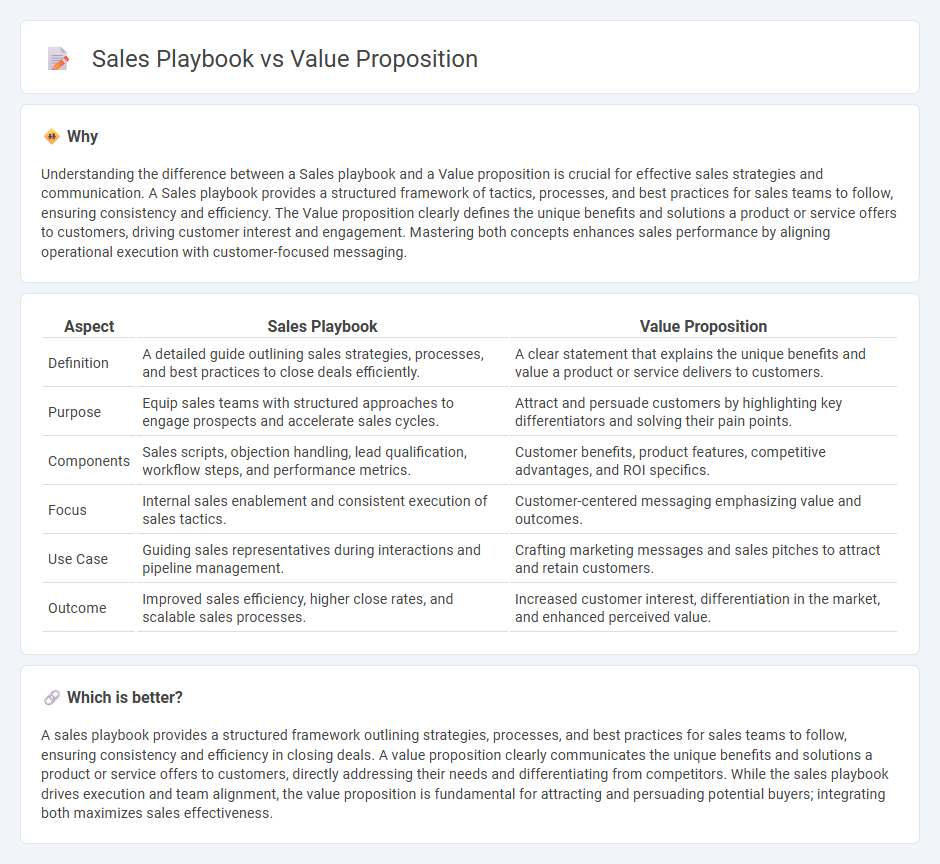
A Sales Playbook provides structured strategies and scripts to guide sales teams through each stage of the selling process, enhancing consistency and efficiency. In contrast, a Value Proposition clearly defines the unique benefits and competitive advantages a product or service offers to customers, forming the core message that drives sales conversations. Discover how combining both tools can exponentially improve sales outcomes and customer engagement.
Why it is important
Understanding the difference between a Sales playbook and a Value proposition is crucial for effective sales strategies and communication. A Sales playbook provides a structured framework of tactics, processes, and best practices for sales teams to follow, ensuring consistency and efficiency. The Value proposition clearly defines the unique benefits and solutions a product or service offers to customers, driving customer interest and engagement. Mastering both concepts enhances sales performance by aligning operational execution with customer-focused messaging.
Comparison Table
| Aspect | Sales Playbook | Value Proposition |
|---|---|---|
| Definition | A detailed guide outlining sales strategies, processes, and best practices to close deals efficiently. | A clear statement that explains the unique benefits and value a product or service delivers to customers. |
| Purpose | Equip sales teams with structured approaches to engage prospects and accelerate sales cycles. | Attract and persuade customers by highlighting key differentiators and solving their pain points. |
| Components | Sales scripts, objection handling, lead qualification, workflow steps, and performance metrics. | Customer benefits, product features, competitive advantages, and ROI specifics. |
| Focus | Internal sales enablement and consistent execution of sales tactics. | Customer-centered messaging emphasizing value and outcomes. |
| Use Case | Guiding sales representatives during interactions and pipeline management. | Crafting marketing messages and sales pitches to attract and retain customers. |
| Outcome | Improved sales efficiency, higher close rates, and scalable sales processes. | Increased customer interest, differentiation in the market, and enhanced perceived value. |
Which is better?
A sales playbook provides a structured framework outlining strategies, processes, and best practices for sales teams to follow, ensuring consistency and efficiency in closing deals. A value proposition clearly communicates the unique benefits and solutions a product or service offers to customers, directly addressing their needs and differentiating from competitors. While the sales playbook drives execution and team alignment, the value proposition is fundamental for attracting and persuading potential buyers; integrating both maximizes sales effectiveness.
Connection
Sales playbooks outline structured strategies and best practices that align closely with a company's value proposition, ensuring consistent communication of product benefits to prospects. Integrating the value proposition into the sales playbook empowers sales teams to effectively articulate unique selling points, addressing customer pain points and differentiating the offering. This connection drives higher conversion rates by fostering tailored conversations that resonate with target audiences.
Key Terms
Differentiation
A value proposition highlights unique benefits and solutions that distinguish a product or service from competitors, emphasizing customer-centric advantages and real-world impact. In contrast, a sales playbook provides structured strategies, tactics, and process guidelines that enable sales teams to effectively communicate and capitalize on the value proposition during client engagements. Explore detailed comparisons and best practices to leverage differentiation for market success.
Messaging
A value proposition clearly defines the unique benefits and core value a product or service offers to target customers, serving as the foundation for all messaging efforts. A sales playbook provides a structured guide for sales teams, detailing effective messaging strategies, objection handling, and customer engagement tactics to close deals more efficiently. Explore our resources to learn how to align your value proposition with a winning sales playbook for optimized messaging impact.
Process
Value proposition defines the unique benefits and solutions a product or service offers to meet customer needs, serving as the foundation for marketing and sales messaging. Sales playbook outlines the step-by-step sales process, including strategies, tactics, and best practices to effectively engage prospects, overcome objections, and close deals. Explore how aligning your value proposition with a well-structured sales playbook streamlines your sales process for maximum impact.
Source and External Links
Value proposition - A company's value proposition is the full mix of benefits or economic value it promises to deliver to current and future customers, differentiating the brand and positioning it in the market by explaining why a consumer should choose its product or service over others.
What is value proposition? | Definition from TechTarget - A value proposition is a clear, concise statement identifying the benefits a company's products or services deliver, designed to differentiate it in the marketplace and convince customers it best meets their needs or solves their problems.
What is the Value Proposition Canvas? - The Value Proposition Canvas is a framework developed by Alexander Osterwalder to align product or service offerings with customer needs by analyzing customer profiles (jobs, pains, gains) and how the company's value proposition creates gains, relieves pains, and fulfills these jobs.
 dowidth.com
dowidth.com